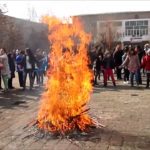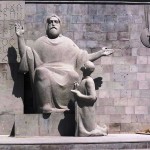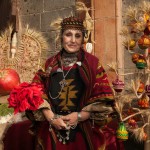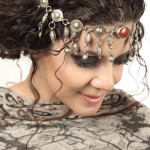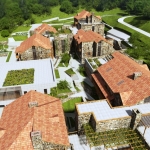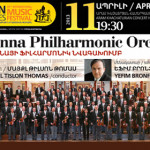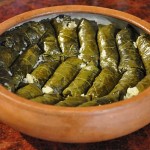Syunik is magnificent in any weather and at all times during the year. Among infinite ridges lasting in all directions it is not known from where and goodness knows where, always there will be something new and unexpected. Even if one is here in the 100-th time, it is necessary to curtail from the main route on any of its lateral branches — and one finds for himself terra incognita where two-stored buses with tourists won’t pass.
At Syunik’s people, especially villagers, have a special dialect. At home, indoors they speak in normal voice of usual timbre, and it is necessary for them to come to light, as voices become louder and above. It appears that this feature is caused by local relief — here in highlands it is difficult to find even a small equal ground and even gardens are grading from one hill to another.
It is difficult to distinguish where ends ones garden and starts neighbor’s.
“During war the enemy shot from there”,- told Lernik, pointing to a hill in some meters distance on which slope even small stones could be distinguished quite with open eyes. The village was destroyed. But people believed for two reasons: first, God was for us, and secondly, it bothered us — it was necessary to take measures”.
The village David-Bek is 20 kilometers far from the north of Kapan, the first city on size in Syunik Region (Marz). On a large-scale map of Soviet period David-Bek was settled down on the small narrow wedge from all directions surrounded by Azerbaijani Soviet Socialist Republic and connected with Armenia only by a strip of the road, curling between mountains.
To find Lenik in David-Bek advised us in Yerevan — a pier, both will show, and will tell. To find him appeared as easy as shelling pears: we asked Lernik in a shop of the village, they called him, and just in few minutes appeared a dusty cloud from which UAZ appeared and got off Lernik. UAZ is a kind of soviet car and on local roads not any jeep will pass. So, when Lernik invited us to change his crew, we obediently agreed. And our faithful editorial iron horse remained to wait in the village center, having been absorbed in a fencing of a monument in the villagers who were lost in the Great Patriotic War.
Lernik got the motor, but suddenly slapped itself a palm on a forehead: we faced brand new beautiful church, and acquaintance with David-Bek should be begun from here. Ten years ago this church and a hall for carrying out various actions near it was constructed by Mihran — as a gift to the native village. Mihran did business somewhere in Russia, affairs went well, and the church was not its unique blessing: he participated in life of villagers.
Subsequently Mihran tragically was lost — he didn’t tell us details, either didn’t know, or didn’t want and we didn’t insist. At the initiative of Lernik in the yard of the church was built a monument.
Church is beautiful. Artist Andranik Antonyan, unique expert in Armenia on restoration of icons, working in Echmiadzin, Cathedral, restored a set of church frescos across all Armenia was engaged in its internal furnish. And so, Mihran constructed this church at hill top, exactly on border of Armenia and Azerbaijan. He was sure the war between these two countries will never start again.
Now the Christian cross stands here. Some meters far from the Church 1836, storing on walls traces of direct hits of shells. It is remarkable nothing neither outside, nor inside, but old men go exactly here. Not that they boycott that new or it isn’t pleasant to them — isn’t present, new they are proud, but more likely as a museum. And to light candles and to keep silent go there where their fathers and mothers went.
Directly over old church lives Sona, a sixty years old woman. The roof of the temple serves as a floor for its verandah, and on Son’s view this verandah read to us a poem about the village David-Bek. The poem didn’t apply at all for high literary advantages. But honest and sincere, it could be studied at local school as the main manual on stories of the native village.
Since the XVIII century under leadership of David-Bek (after who is named the village) in local places there was a fight against Turks and Persians, and actually the period of more or less stable world came only with arrival of Bolsheviks. Their era, however, ended too, and that was after, all know. As the list of the ships at Homer, named Ashot and Jivan, Sarkis sound in Sona’s poem and other heroes who protected the village.
But Sona refused being photographed telling us that she was dressed in home-style and also that her hair was not brushed.


